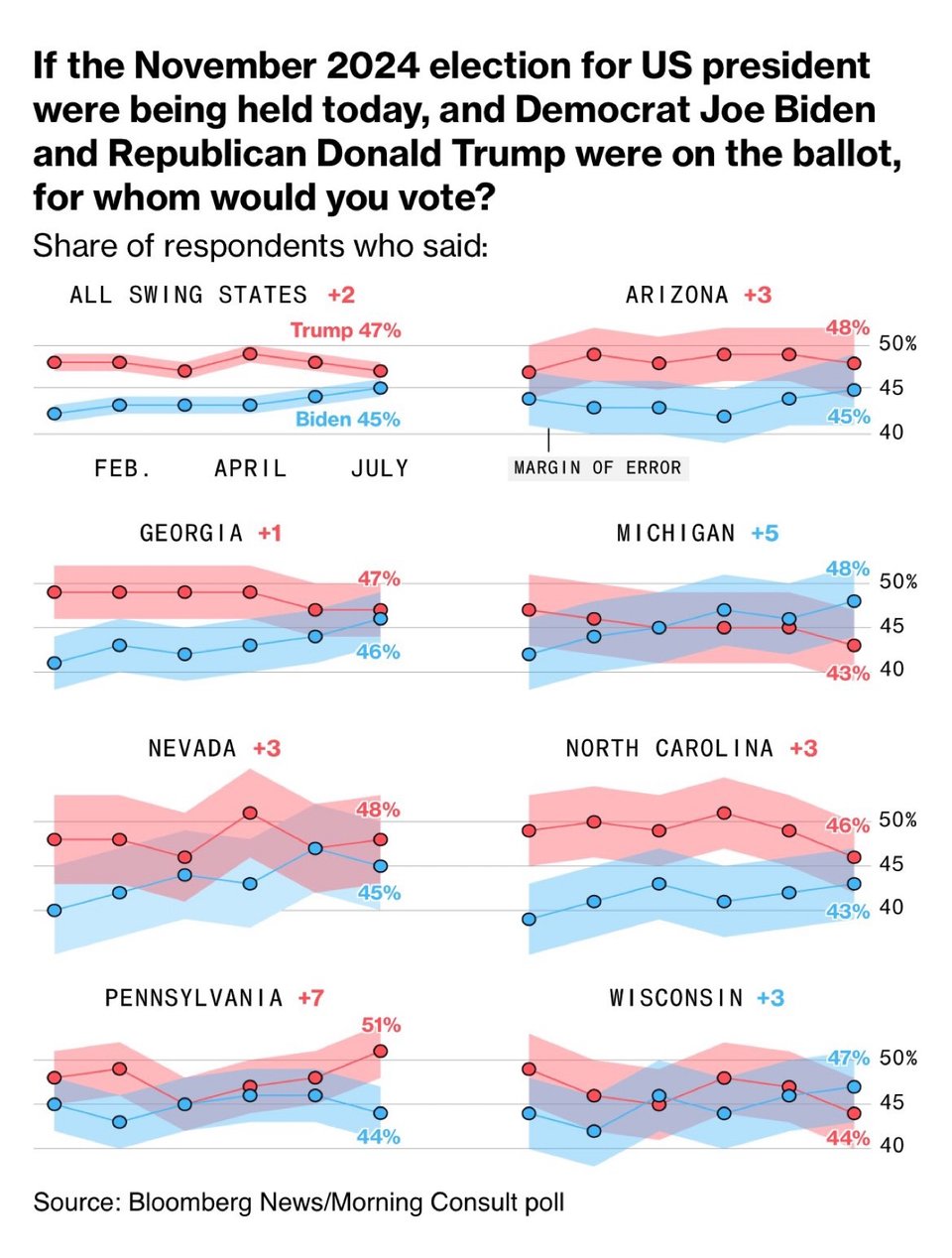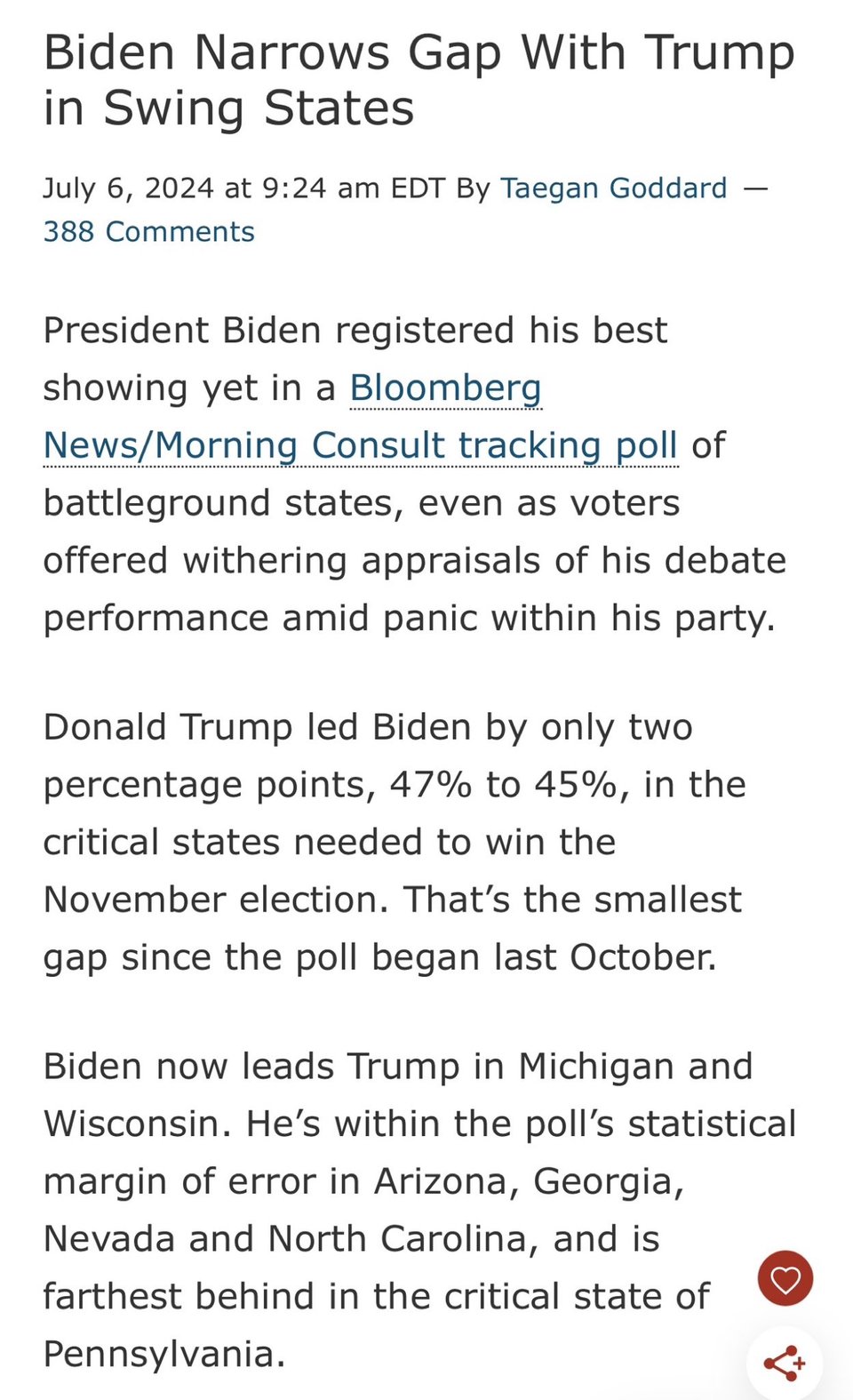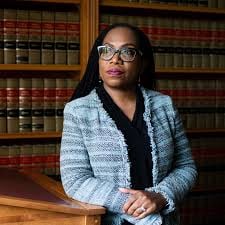Sunday, July 7, 2024. Annette’s News Roundup.
Joe is always busy.
https://x.com/potus/status/1809287379192066342?s=61&t=I_Od53CbnPTsbLcD0baXPg
Touch to watch. 👇
https://x.com/joebiden/status/1809317737556222075?s=61&t=I_Od53CbnPTsbLcD0baXPg
Touch to watch the military families on the White House lawn after the 4th of July fireworks.👇
https://x.com/onestpress/status/1809041065967599712?s=61&t=I_Od53CbnPTsbLcD0baXPg
Here are the latest polls.
President Biden “registered his best showing yet in a Bloomberg News/Morning Consult tracking poll of battleground states” on Saturday morning.
Worry less. Do more.


A look at the Court.
Supreme Court's Roberts turns court to the right as Barrett emerges as a key player.

The U.S. Supreme Court wrapped up an historic and momentous term this week, reshaping presidential powers by granting former President Donald Trump an immunity from prosecution that had been unimaginable to previous presidents.
Cast aside, among other precedents, was a legal opinion embraced by every Justice Department, Republican and Democratic, for more than a half century: a legal opinion that said presidents cannot be criminally prosecuted while in office, but can be held to account in court after leaving office. That’s why President Ford pardoned President Nixon after Nixon resigned, and why Nixon accepted the pardon. Both understood he would be prosecuted in connection with the Watergate scandal unless he was pardoned.
But all those assumptions — including the notion that presidents are not above the law — were called into question by the Supreme Court’s decision last Monday, written by Chief Justice John Roberts, and blasted by Justice Sonia Sotomayor in her dissent.
For Roberts and the other conservatives on the court, the real threat was that presidents would be “enfeebled” if they could be prosecuted after leaving office for things they did while in office. And so Roberts crafted a decision that did three things: It totally immunized presidents from prosecution for their “core” acts as president; it granted them a presumption of immunity overall, and for leaving office; and it said there is no immunity for completely private acts.
For the three dissenters, Roberts’ opinion was an open invitation to criminal conduct by future presidents. In a rare oral dissent from the bench, Sotomayor spoke for nearly a half hour. Concluding without the usual “ I respectfully dissent,” she said simply, “With fear for our democracy, I dissent.”
The immunity decision sent the election subversion case against Trump back to the trial judge to decide what charges would survive, thus guaranteeing that the former president would not face trial until after the election, if ever.
Indeed, for Trump, who during his tenure as president and afterward often railed against the court, this was a great Supreme Court term; he got everything he wanted, and sometimes more than his own lawyers asked for.
Justice Barrett breaks off from the court's conservatives
In addition to giving him practical immunity from prosecution, the court restored his name to the ballot in states that had banned him because of his participation in the Jan. 6 attempt to reverse Joe Biden’s electoral victory. While the justices were unanimous on the outcome, conservative Justice Amy Coney Barrett, the last of the Trump appointees, wrote separately to say that the majority had gone further than necessary in declaring that the Fourteenth Amendment's ban on insurrectionists in the government could only be enforced with additional congressional action, a point made also by the court’s three liberal justices. Or as University of Chicago law professor William Baude put it in an op-ed piece, the chief justice “concocted” a position not proposed by any of the lawyers in the case.
Barrett similarly broke off from the court’s other conservatives in the Trump immunity case; for her, the chief justice’s opinion went too far in barring evidence of wrongdoing by a president after he leaves office — for example, barring evidence that a president received millions of dollars in exchange for a pardon. The pardon is protected under the Constitution, she observed, but not the evidence of the bribe, and a bribe is what's illegal under federal law.
Her more subtle view of presidential power reflects, perhaps, her life experience. The court’s other conservatives spent much of their careers before becoming judges as acolytes of Republican presidents, toiling in the White House or the Justice Department, and viewing opposition party attacks as an assault on presidential power. All either grew up in Washington or came to D.C. as young men. Roberts was an associate counsel in the Reagan White House and a top Justice Department aide; Brett Kavanaugh worked in the George W. Bush administration as staff secretary, sitting just outside the Oval Office; and Neil Gorsuch was a teenager in the nation’s capital when his mother, Reagan appointee Anne Gorsuch, became the first agency director to be cited for contempt of Congress.
In contrast, Justice Barrett grew up in Louisiana and spent almost all of her professional life in academia at Notre Dame Law School in South Bend, Ind., far from the power politics of Washington.
So it may be unsurprising that she has a conservative, but different world view from the court’s other conservatives. Indeed, she wrote the dissent for herself and the court’s three liberals in two important cases. One was the court’s decision to block an EPA plan to curb air pollution that floats from one state to another.
The other was the court’s decision making it more difficult to prosecute Jan. 6 rioters. She viewed the case against the rioters as “open and shut,” and she was incredulous that the defendant, who invaded the capitol and allegedly assaulted a police officer, could not be tried for obstructing and impeding an official proceeding, namely the counting of the Electoral College votes at the Capitol that day.
Admittedly, she wrote, Congress, when it passed this broad law, did not have in mind the events of Jan. 6th, but she added caustically, “Who could blame Congress for that failure of imagination?”
In several cases this term, she wrote concurring opinions that pushed back against the courts three most conservative justices on the question of “originalism,” specifically as to what role history and tradition should play in deciding constitutional cases. For instance, in a case testing a federal law that makes gun possession a crime for anyone under court order for domestic abuse, she wrote a concurring opinion stressing that gun regulations, in order to be upheld “need not be an updated model” of a law that existed at the nation’s founding.
“History is consistent with common sense,” she wrote. “It demonstrates that legislatures have the power to prohibit dangerous people from possessing guns.”
“We really saw Amy Coney Barrett come out of whatever was left of her shell this term,” observes Georgetown law professor Steven Vladeck. “She really has a series of principles” that we may or may not agree with, but “she’s going to follow them” even when they are not aligned with her political preferences.” (Nina Totenberg, NPR).
How low can MAGA go?
How low can Mike Lee go?
https://x.com/basedmikelee/status/1809379040496873530?s=61&t=I_Od53CbnPTsbLcD0baXPg
https://x.com/adamkinzinger/status/1809386305949753721?s=61&t=I_Od53CbnPTsbLcD0baXPg
Mr. Biden was filmed walking off of Air Force One when it arrived in Delaware after his trip to Wisconsin. This “report” is false.
Shame on the Senator from Utah!
Possible good news.
Perhaps Justice Jackson’s dissent shows a path to halt possible results of the majority opinion on January 6th verdicts?

Ketanji Brown Jackson saves Fischer - The Washington Post
Ketanji Brown Jackson saves J6 and Trump prosecutions — for now.
The Supreme Court, in eviscerating decades of administrative law, running roughshod over women’s privacy rights and impeding the federal government’s power to regulate securities law, has aggrandized more power to itself than any court in history. However, in one tiny ray of sunshine, we saw on Friday in the Fischer case, that with the handiwork of Justice Ketanji Brown Jackson, the court’s avarice can be contained.
As a result of her vote, the court’s majority left prosecutions of felon and former president Donald Trump unchanged (for now) and severely limited any impact on hundreds of other Jan. 6 insurrection cases. A tiny fraction of the Jan. 6 defendants will actually be affected.
The obstruction statute 18 U.S.C. Section 1512 (c)(1), at issue in many Jan. 6 cases, prohibits “altering, destroying, mutilating, or concealing a record, document, or other object with the intent to impair the object’s integrity or availability for use in an official proceeding.” The court had to decide what actions are covered by the subsequent Section 1512(c)(2), which penalizes conduct that “otherwise obstructs, influences, or impedes any official proceeding, or attempts to do so.”
What does “otherwise” mean? The court declined to either take the broadest or most narrow definition available. Instead, it held: As we have explained, subsection (c)(1) refers to a defined set of offense conduct — four types of actions that, by their nature, impair the integrity or availability of records, documents, or objects for use in an official proceeding. When the phrase “otherwise obstructs, influences, or impedes any official proceeding” is read as having been given more precise content by that narrower list of conduct, subsection (c)(2) makes it a crime to impair the availability or integrity of records, documents, or objects used in an official proceeding in ways other than those specified in (c)(1). For example, it is possible to violate (c)(2) by creating false evidence — rather than altering incriminating evidence.
The crimes, such as creating false documents (say, phony electoral ballots), are covered, but general obstruction activities are not. The crime must be tethered to the objects and/or documents at issue in the proceeding.
The key to understanding the decision is Justice Ketanji Brown Jackson’s concurrence. She explained exactly what the court did: Joseph Fischer was charged with violating §1512(c)(2) by corruptly obstructing “a proceeding before Congress, specifically, Congress’s certification of the Electoral college vote.” That official proceeding plainly used certain records, documents, or objects — including, among others, those relating to the electoral votes themselves. And it might well be that Fischer’s conduct, as alleged here, involved the impairment (or the attempted impairment) of the availability or integrity of things used during the January 6 proceeding “in ways other than those specified in (c)(1).” If so, then Fischer’s prosecution under §1512(c)(2) can, and should, proceed.
In other words, even this defendant might still be convicted of conduct related to records, documents or objects in the congressional proceeding if he was seeking to destroy the electoral ballots. (Fischer was also charged with other conduct under other statutes.)
“As Justice Jackson’s concurring opinion makes clear, the Court’s interpretation of Section 1512(c) is still broad enough to cover Fischer’s alleged conduct,” constitutional scholar Matthew Seligman, who authored an amicus brief for the case told me. “By violently storming the Capitol, the violent Jan. 6 rioters impaired the availability of the electoral certificates that Congress convened to count — Senate staffers had to flee the building with the certificates so they weren’t destroyed.” In short, Seligman concludes that “while the Court narrowed the government’s expansive interpretation, it did so in a way that will affect few — if any — actual Jan. 6 cases.”
In other words, creating electoral vote slates (as Trump allegedly did) would still be prosecutable. This decision therefore has essentially no impact on Trump, who was charged with four criminal counts including 1512(c)(2) and conspiracy to violate 1512(c)(2). His alleged involvement in concocting false electoral slates falls four-square within the court’s ruling. (Depending on the fine print, the court’s immunity case could still restrict his prosecution.)
As for the rest of the Jan. 6 insurrection defendants, the Justice Department in a statement released after the decision made clear: “The vast majority of the more than 1,400 defendants charged for their illegal actions on January 6 will not be affected by this decision. There are no cases in which the Department charged a January 6 defendant only with the offense at issue in Fischer.” Just Security co-founder Ryan Goodman explains how the media exaggerated the impact of Fischer. “A quarter of [the defendants] pleaded guilty but NOT to obstruction,” he emphasized. “They pleaded to other charges. Those charges and those sentences are utterly unaffected by Supreme Court’s ruling.” It is really a sliver of a sliver who might be affected.
For example, all 128 people convicted at trial under 1512(c)(2) were also convicted of other crimes. At worst, they would need to be resentenced if their 1512(c)(2) conduct did not fall within the Supreme Court’s opinion. Beyond that, the legal gurus at Just Security found that for the “71 defendants who have been charged under Section 1512(c)(2) and are still awaiting trial, all of them are charged with crimes in addition to 1512(c)(2), and a majority are charged with one or more other felonies.” Depending on the facts, their 1512(c)(2) charge could either be dropped or their sentencing could proceed as charged. Of the very small number of defendants (48) who pleaded to obstruction under 1512(c)(2), 22 were also charged with another felony. The other 26 pleaded just to a 1512(c)(2) count; all but 11 of those could be charged with another felony such as civil disorder and theft of government property.
A grand total of 11 defendants — who pleaded only to a 1512(c)(2) offense with no other felonies available — conceivably might have those reduced to misdemeanors. (There are also a group of 73 people either convicted at trial or waiting for trial on 1512(c)(2) plus one or more misdemeanors.) That is it. Fischer in no way opens the prison doors, and it certainly gives Trump absolutely no comfort.
This is not to tout the reasonableness of the right-wing majority. Having snatched immense powers from the executive branch and Congress this term, the court’s unbridled activism is undeniable. We certainly have seen an untrammeled imperial court dragging government back to the 1920s (on nonregulation of air, water, workplace safety, etc.) and individual rights to the 19th century. It has run roughshod over our democracy, which empowers the people’s elected representatives to make policy decisions. Rather, Fischer stands as a lonely exception, an example of judicial finesse.
Two points deserve further mention. Most vividly, this case serves as yet another glaring example of the mainstream media’s rush to hysterical conclusions. Overwrought headlines after the decision came down suggested hundreds of cases would be overturned. Those were inaccurate. Precision should take precedence over clickbait. Second, if Trump gets more appointees for the Supreme Court and the rest of the federal bench in a second term, there might be no brake on the damage this court can do. The prospect that the court could get worse should send chills up and down the spines of all Americans. (Jennifer Rubin, Washington Post).
Your Daily Reminder
Trump is a convicted felon.
On May 30th, he was found guilty on 34 felony counts by the unanimous vote of 12 ordinary citizens.
The Convicted Felon Donald J. Trump was scheduled to be sentenced on July 11. He will now be sentenced sometime around September 18th.
Poll: Young voters in 12 states, including Florida, think Donald Trump’s felonies disqualify him.
Under-30 voters in a dozen states — including Florida — are further souring on Donald Trump’s candidacy in the wake of damaging court verdicts against the former President, newly released polling figures show.
Seventy-four percent of voters 18-29 in Florida, Arizona, Georgia, Michigan, Nevada, New Hampshire, North Carolina, Ohio, Pennsylvania, Texas, Virginia and Wisconsin think Trump, as a convicted felon, shouldn’t be allowed near the White House again.
That includes a majority of Democrats, Republicans and independents, according to Washington-based public research firm The Generation Lab, which surveyed 1,080 young voters in early June for Voters of Tomorrow, a Generation Z-led progressive election engagement organization.
My goal is for all Roundup subscribers to check their registration.
Even if you think you know, use this link 👇 to find out your voter registration status.
Are you registered to vote? Find out now.
A reminder by Ali Velshi on why we all have to rally around Joe.
Thanks to my sister for pointing out Ali’s passionate call to all of us to save Democracy.
Watch and share.👇